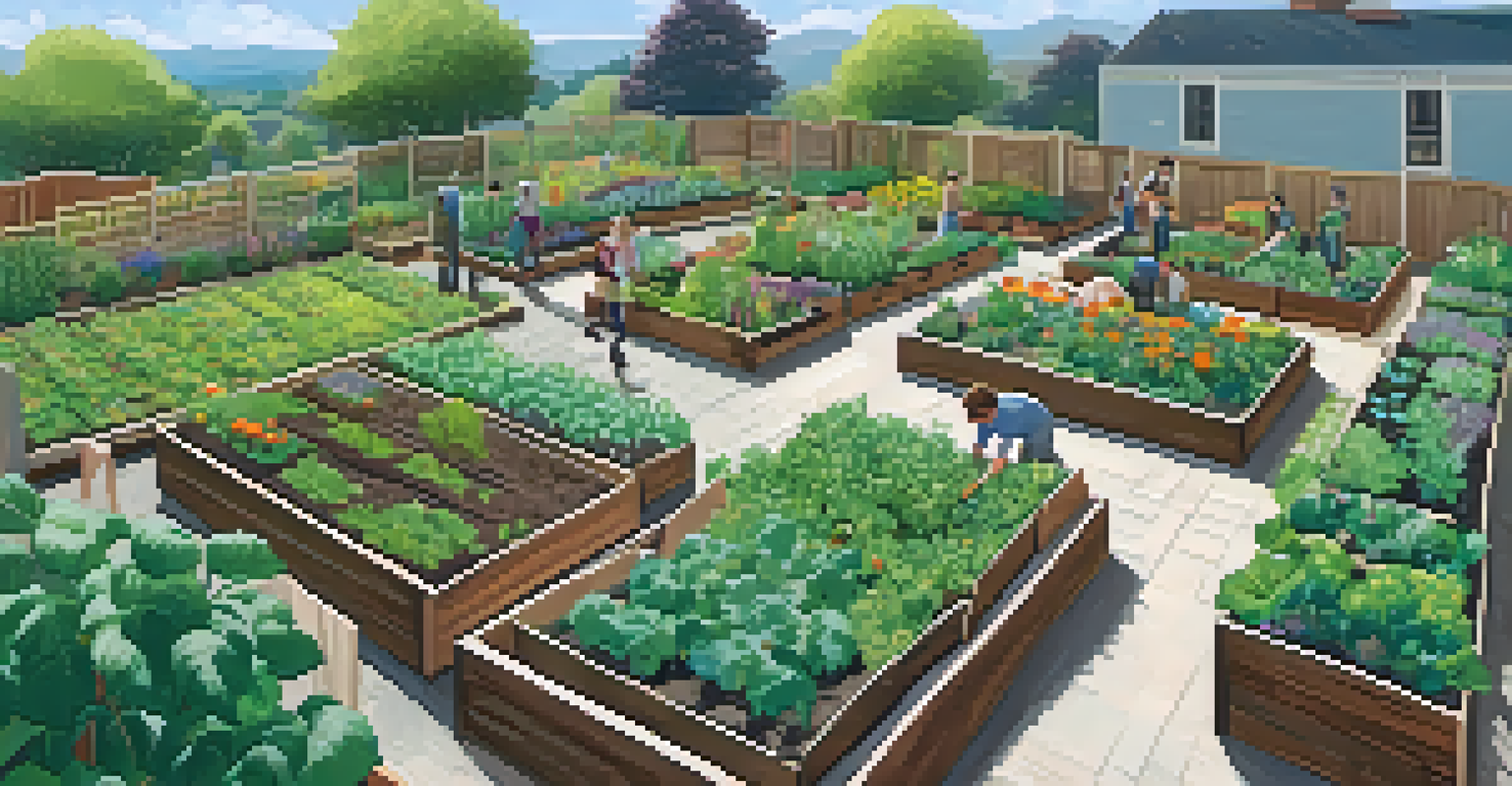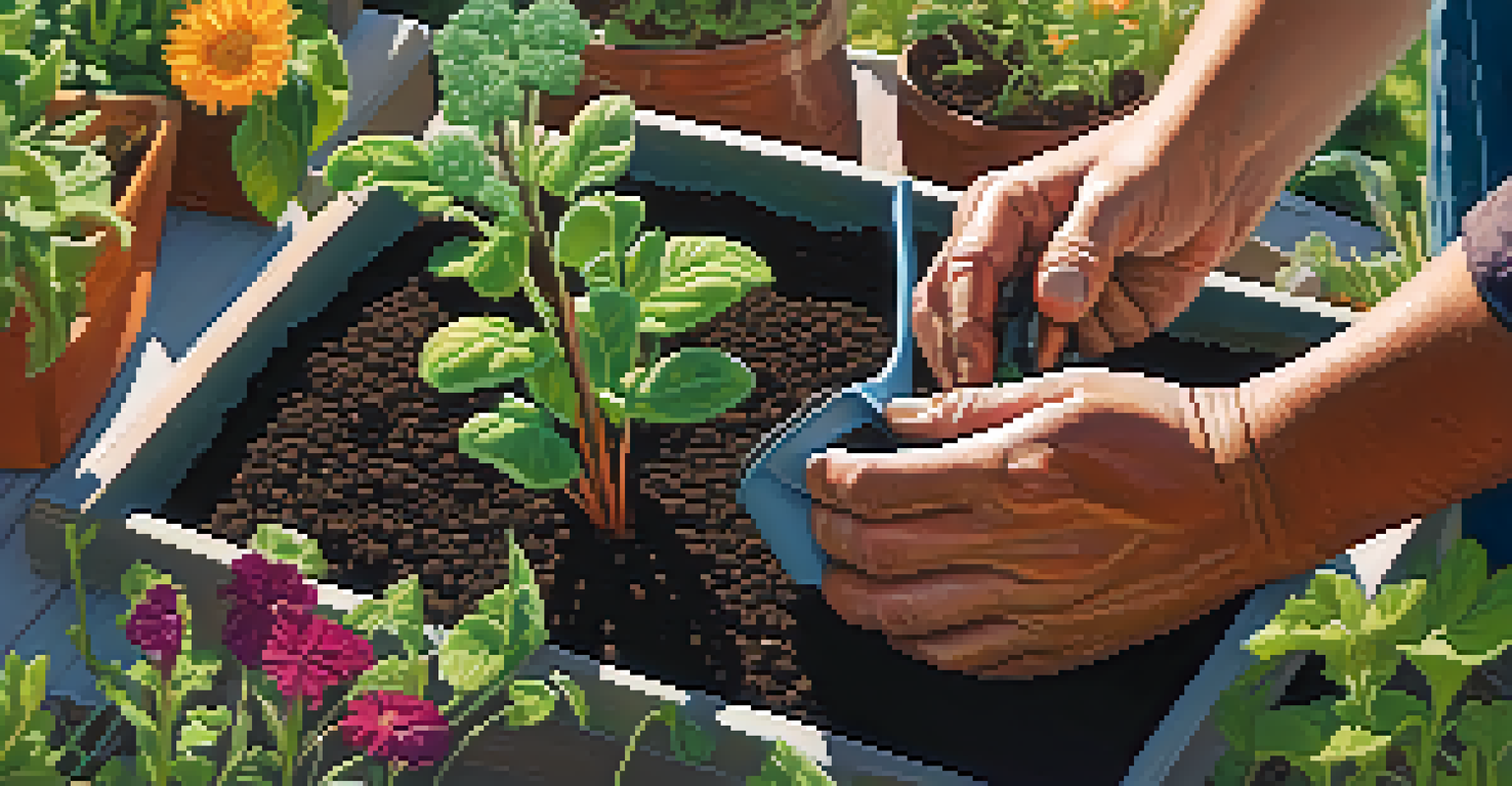How Carlsbad's Community Gardens Foster Urban Agriculture

The Rise of Community Gardens in Carlsbad
In recent years, Carlsbad has witnessed a blossoming interest in community gardens, reflecting a growing desire for sustainable living. These gardens not only beautify urban spaces but also serve as vital hubs for local food production. As residents come together to cultivate these green areas, they foster a sense of community and shared purpose.
Community gardens are a reflection of our shared values and a commitment to the health of our neighborhoods.
Community gardens in Carlsbad provide residents with the opportunity to engage with nature, learn about gardening, and appreciate the joy of growing food. Each plot becomes a canvas for creativity, where individuals can express their gardening styles while contributing to the overall health of the neighborhood. This movement is a testament to the power of collective effort in urban agriculture.
Moreover, these gardens help combat urban challenges like food deserts, where access to fresh produce is limited. By turning vacant lots into productive spaces, Carlsbad's community gardens are not just growing vegetables; they’re cultivating resilience within the community.
Benefits of Urban Agriculture for Carlsbad Residents
Urban agriculture offers a plethora of benefits that extend beyond just fresh food. For Carlsbad residents, these gardens promote healthier eating habits by providing easy access to organic fruits and vegetables. This accessibility encourages families to incorporate more produce into their diets, fostering a culture of wellness in the community.

Additionally, community gardens serve as educational platforms where people of all ages can learn about sustainable practices. Workshops on composting, organic gardening, and permaculture often take place in these gardens, empowering residents with knowledge that they can apply at home. This hands-on experience helps demystify the food-growing process, making it more approachable for everyone.
Community Gardens Boost Local Unity
These gardens foster a sense of community by bringing residents together to nurture plants and share knowledge.
Lastly, gardens create a unique space for social interaction, breaking down barriers and building relationships among diverse community members. Whether through shared gardening tasks or community events, these interactions strengthen social ties and enhance neighborhood cohesion.
Promoting Biodiversity Through Community Gardens
One of the often-overlooked benefits of community gardens is their role in promoting biodiversity. Carlsbad's gardens create microhabitats that support various species of plants, insects, and wildlife. This diversity is crucial for maintaining healthy ecosystems, as it encourages pollination and pest control naturally.
The future will be green, or not at all.
By incorporating a variety of plants, gardeners can attract beneficial insects like bees and butterflies, which play a vital role in our food systems. This not only enhances the beauty of the gardens but also increases productivity and resilience against pests. It’s a win-win for both the environment and the gardeners.
Furthermore, community gardens often serve as a resource for native plant species, helping to preserve local flora. By cultivating native plants, gardeners can contribute to the ecological balance of the area, ensuring that Carlsbad's natural heritage is celebrated and maintained.
Community Engagement and Collaboration in Gardening
Community gardens thrive on the concept of collaboration, bringing together individuals from all walks of life to work towards a common goal. In Carlsbad, these gardens are often managed by local organizations that facilitate volunteer opportunities and events. This structure encourages participation and ensures that everyone has a stake in the garden’s success.
Volunteers come together to plant, maintain, and harvest crops, fostering a sense of ownership and pride in their work. These collaborative efforts not only enhance the gardens but also build friendships that can last a lifetime. The shared experience of nurturing plants cultivates a profound connection among participants.
Urban Agriculture Enhances Wellbeing
Access to fresh produce from community gardens encourages healthier eating habits and promotes a culture of wellness.
Moreover, community events such as harvest festivals or potluck dinners create an atmosphere of celebration and inclusivity. These gatherings provide a platform for residents to share their gardening successes and learn from each other, further strengthening the bonds within the community.
Challenges Faced by Carlsbad's Community Gardens
While community gardens are a source of joy and growth, they also face several challenges that can hinder their progress. Issues like limited funding, maintenance concerns, and the threat of urban development can pose significant hurdles. Garden coordinators often work tirelessly to navigate these obstacles, seeking grants and community support to ensure the gardens thrive.
Another challenge is the variability in gardener commitment. With busy schedules, some participants may struggle to dedicate sufficient time to their plots, which can lead to neglected areas. This inconsistency can affect the overall health of the garden and discourage others from participating.
Despite these challenges, the resilience of the community shines through. Many gardens implement strategies to engage volunteers and promote consistent participation, proving that with determination and collaboration, obstacles can be overcome.
Sustainability Practices in Carlsbad's Community Gardens
Sustainability is at the heart of Carlsbad's community gardens, where eco-friendly practices are embraced to minimize environmental impact. Many gardeners utilize organic methods, avoiding synthetic pesticides and fertilizers in favor of natural alternatives. This not only protects the health of the soil but also ensures that the produce grown is safe for consumption.
Additionally, water conservation techniques, such as drip irrigation and rainwater harvesting, are commonly employed to reduce waste. By using resources efficiently, these gardens set a powerful example of how urban agriculture can be both productive and environmentally responsible.
Sustainable Practices Drive Success
Carlsbad's community gardens implement eco-friendly practices, contributing to environmental health and resource efficiency.
Furthermore, composting initiatives in these gardens help recycle organic waste, turning kitchen scraps into valuable nutrients for the soil. This closed-loop system not only enriches the garden but also reduces landfill waste, showcasing how community gardens can contribute to a circular economy.
The Future of Urban Agriculture in Carlsbad
Looking ahead, the future of urban agriculture in Carlsbad appears promising as more residents recognize the value of community gardens. As awareness grows, so does interest in expanding these green spaces to reach underserved areas of the city. This expansion can help alleviate food insecurity while fostering a deeper connection to food sources.
Innovative initiatives, such as vertical farming and hydroponics, are also gaining traction within urban settings. These methods can maximize space and efficiency, allowing even more people to participate in growing their own food, regardless of their living situation.

Ultimately, the ongoing success of community gardens will rely on community involvement and support. By continuing to collaborate, educate, and innovate, Carlsbad’s residents can ensure that their urban agriculture movement remains vibrant and sustainable for generations to come.